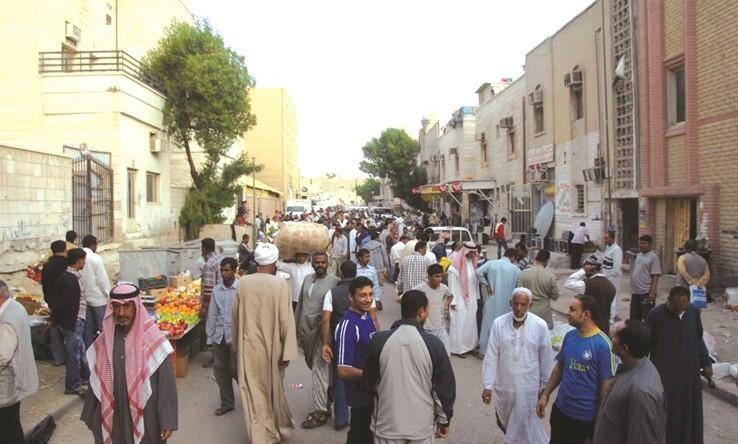Minister of State for Municipal Affairs and Minister of State for Communications Fahd Al-Shoula has referred a draft law to the Council of Ministers that bans non-family members living in some residential areas.
Al-Shuala explained in his letter that the final review of the project was carried out by the Fatwa and Legislation Department submitted by the municipality, which includes the explanatory memorandum for the project, reports Al-Anba daily.
There are 10 articles, the most prominent of which is a fine of 5 thousand dinars for each violator of the process of prohibiting leasing or renting residential units for non-families in private housing areas.
The project also included the impermissibility of registering and issuing civil cards to non-family tenants of residential units in residential areas. The following are its legal articles.
Article (1): In applying the provisions of this law, the following words and phrases shall have the meaning indicated next to each of them:
Family: A group of people consisting of a husband and wife, their children, and relatives up to the fourth degree or some of this group, provided that it is not less than two people.
A Kuwaiti woman who is widowed, divorced, or single and has reached the age of forty is considered family by law.
Private housing areas: low-density areas whose units are designated as family housing, whether established by individuals or the private sector.
Model housing areas: Light-density areas whose units are designated as family housing, and were established or whose lands were distributed by the state within the housing welfare program using unified or different architectural designs (model).
Article (2): It is prohibited to delay or rent residential units or parts thereof to accommodate non-families in private and model housing areas. It is also prohibited to accommodate non-families in these areas. In the event that they are rented to those not covered by the ban, the owners of these units must submit a copy of the lease contract to the municipality for approval. Approved by the district mayor.
Any contract or agreement concluded in violation of the provisions of this law is void and has no legal effect.
Article (3): It is not permissible to register and issue civil cards to tenants and occupants of residential units – other than families – in typical and private housing areas except after confirming the relationship with the property owner or his spouse up to the fourth degree.
Domestic workers are excluded from the provisions of the previous paragraph.
The Authority notifies the municipality, through its automated system for real estate lease contracts and any other systems, of all data related to renting residential units in private and private housing areas, and any changes that occur thereon periodically.
Article (4): The Ministry of Interior shall inform the municipality and the Public Authority for Civil Information of a copy of the notification stipulated in Article (7) bis of Law No. (17) of 1959 referred to for the work of its affairs.
Article (5): The employees designated by the Minister of State for Municipal Affairs shall have the capacity of judicial officers, and they shall have the right to detect the violations stipulated in this law, prepare the necessary reports, and refer them to the Public Prosecution.
If there is strong evidence that violations have been committed in private or model housing, they may submit a report. The Public Prosecution shall be notified of their investigations through the Director General of the Municipality or his authorized representative to request permission to enter those dwellings.
If it is confirmed to the Public Prosecution that it is necessary to grant permission to enter, it shall authorize this in writing. Employees who have judicial police status may write reports of such violations and refer them to the Public Prosecution. In all cases, they must seek the assistance of members of the police force.
Article (6): The Director General of the Municipality or whomever he delegates from among his deputies shall issue a decision to administratively evacuate the violating unit of its violating occupants, and by a decision from him or whomever he delegates from among his deputies, it is permissible to take the necessary measures to cut off the electricity and water supply to the violating unit.
The competent municipal employees may seek the assistance of members of the police force when implementing the evacuation decision.
Article (7): The Public Prosecution is solely responsible for investigating, acting on, and prosecuting the crimes stipulated in this law, and the Municipal Public Prosecution shall be notified of the final, enforceable rulings.
Article (8): Without prejudice to any more severe penalty stipulated by another law, anyone who violates the provisions of Article Two of this law shall be punished with a fine of not less than one thousand dinars and not more than five thousand dinars, and the penalty shall be doubled in the event of return and in all circumstances. The court orders the eviction of the property from its occupant.
The violator who refuses to implement the ruling ordered to evacuate the property will be punished with a fine of twenty dinars per day, after the expiry of the period specified by the municipality to implement the ruling.
Article (9): The aforementioned Decree Law No. 125 of 1992 and every provision that conflicts with the provisions of this law shall be repealed.
Article (10): Ministers – each within his jurisdiction – must implement this law, and it shall come into effect from the date of its publication in the Official Gazette.

